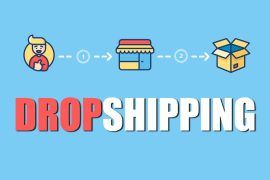
It can be challenging to find a cloud service provider you can trust with your sensitive data and crucial tasks without in-depth research. There are hundreds of cloud service providers. So, how can you determine which cloud service provider is ideal for you?
You should consider many factors while looking for the ideal cloud provider for you, whether you are a small or a large business. Therefore, we at SaaSworthy have put together the 7 most important tips to help you choose the right cloud service provider for your business.
Table of Contents
What do you mean by a cloud service provider?
A cloud service provider (CSP) is a third-party firm that offers computing cloud services to other businesses and people. This technology quickly dominated the market as businesses preferred remote access to their data. These cloud technologies allow for multi-user systems and remote control. Clouds can be classified into three types: public, private, and hybrid.
A public cloud is one that is hosted and maintained by a cloud service provider and is accessible to the general public. A private cloud is one in which cloud infrastructure and services are rented from a cloud service provider but housed on the company’s premises. Finally, a hybrid cloud is a blend of public and private clouds.
What is the importance of using a cloud service provider?
Cloud service providers significantly decrease hassles for entrepreneurs by outsourcing various IT responsibilities to a third-party cloud provider. They include website maintenance, file storage, and data backup. Cloud services may also help small businesses save money by eliminating the need for in-house IT staff and on-premise hardware.
Simple Internet accessibility, minimal infrastructure investment, and quick scalability to accommodate growing business development are all reasons to choose a cloud service provider. In addition, they have the potential to be a more environmentally friendly technology that minimizes the need for redundant storage hardware.
7 tips for choosing the perfect cloud service provider

Let’s take a look at the 7 tips you should consider before selecting a cloud service provider for your business.
1. The cost of the cloud service provider
There is no disputing that cost will significantly influence which cloud service provider you select. The cost of products and services may differ from cloud to cloud, depending on your requirements. If you don’t prepare carefully and don’t have a team of specialists, your cloud services may wind up costing more than on-premises.
Although a CSP offering low-cost services may appear appealing, it may not provide you with the best level of service. However, this does not imply that the most costly CSP is always the best. The crucial thing you can do is compare them all, haggle, and even ask for special discounts and deals.
Furthermore, the CSP’s pricing plans should be flexible enough to include all of the services you want in the appropriate price range. Finally, you must examine your usage patterns (or projected usage patterns) to identify which CSP best suits your business model, schedule, budget, etc.
2. The security of the cloud data
Check a CSP’s data security compliance and whether they can avoid data breaches. You cannot afford to make compromises when it comes to security. So, it’s essential to ask specific questions to the CSP about your industry, specific use cases, legal needs, etc. Do not overlook the importance of evaluating this critical aspect of cloud services.
You should know precisely the security measures provided by each provider, your security objectives, and the processes they employ to protect your apps and data. Consider the default security features offered by each CSP, what extra paid security features are available, and for what security features you may need a third party.
If you intend to store a large amount of data in the cloud, confirm the actual location of the server. In addition, the CSP’s security processes should include sophisticated security features such as data encryption, multi-factor authentication, and access control systems. It should also have enterprise-grade firewalls and intrusion detection and prevention systems.
3. The architecture of the cloud service provider
Check if the provider’s platform and chosen technologies are compatible with your present environment and meet your cloud goals. Consider how the architecture will be integrated into your operations both now and in the future when selecting a CSP. When making your selection, you should also examine cloud storage architectures.
Each service provides choices for storing and retrieving data on a frequent vs infrequent basis (hot vs cool storage). Determine how much re-coding or customization is required to make your workloads appropriate for their platform. Determine if the provider’s cloud architectures, services, and standards match your workloads and management preferences.
Ascertain that you have a thorough knowledge of the assistance available, map it against project tasks, and then select. Service providers mostly have technical personnel who can fill skill shortages in your migration teams. However, some large-scale public cloud providers give minimal support, and you may require extra third-party assistance to address expertise shortages.
4. The cloud service level agreements

A service level agreement (SLA) is a written agreement that specifies the service standards, terms, and conditions. SLA is a contract between you, the client, and a cloud provider that specifies the minimum level of service you may anticipate. When a company’s capacity, availability, support requirements, and reaction time are stringent, this factor is critical.
You must be able to trust your CSP, and a legal agreement must be in place to protect you if anything problem occurs. When analyzing the suitability of any CSP, read through its SLA and check for essential factors. These include the company’s security policies, the provider’s action in the case of data loss or failures, and the possible downtime.
Determine the SLAs in place for the cloud provider’s service availability. In general, agreements range from pre-packaged “terms and conditions” signed online to personally customized contracts and SLAs. You could also propose that the service provider create an individual SLA for customized cloud solutions.
5. The cloud compliance of the cloud service provider
Ensure that you select a cloud architecture platform that can assist you in meeting industry and organizational compliance criteria. Make certain that you understand what it will take to ensure compliance once you migrate your apps and data on a public cloud architecture. Make sure you understand your obligations and which compliance elements the provider will assist you in checking off.
While many CSPs appear to hold the majority of the standard compliance certifications, there may be some compliance requirements that one cloud provider does not meet. Therefore, you must ascertain your compliance requirements and ensure that your cloud service providers meet them.
Select a service provider who adheres to industry standards such as ISO 27001 or the government’s Cyber Essentials Scheme. If they comply with the ISO 27000 series standards or have recognized certifications, verify their validity. Also, get assurances of resource allocation such as personnel and budget to maintain compliance with these frameworks.
6. The customer support of the cloud service provider
Another factor that you must carefully consider is support. Because of the involvement of IT difficulties, you should consider support availability while selecting a hosting service. In certain situations, the only way to receive assistance is through a chat service or a call center. You may have access to a specialized resource in other situations, but there will be time and access limitations.
Before selecting a cloud service, inquire about the level and type of assistance you will have access to, as well as the additional cost. You must determine what kind of support you require, how much it will cost, and which support package is best for you. The mode of support (email, voice, text) provided is equally critical.
Some CSPs provide assistance for a restricted number of instances and only during business hours. If you work on weekends or holidays, choose a CSP that offers 24/7 service, including weekends and holidays.
7. The reliability of the cloud service provider

There are numerous techniques for determining a cloud service provider’s reliability. You can compare the cloud service provider’s performance over the previous 6-12 months against their SLAs. Don’t anticipate perfection. Downtime is unavoidable, and every CSP will encounter it at some moment. What matters is how the provider handles downtime.
Check that the monitoring and reporting tools available are adequate and can be integrated into your overall management and reporting systems. Ascertain that your selected cloud service provider has defined, documented, and proven methods for coping with scheduled and unforeseen downtime. This is a crucial aspect to double-check because recovering data during a disaster is a significant duty.
They should have strategies and processes that outline how they intend to communicate with consumers during disruptions, including timeliness, priority, and severity level evaluation of concerns. When service difficulties develop, be aware of the cloud provider’s remedies and liability restrictions.
Conclusion
Which is the best cloud service provider? The answer is not simple. It all relies on your business requirements and other aspects like your staff’s experience, the sort of cloud service, etc.
If you have a small business, you may be able to get by with only one cloud service provider. But, if you are a medium-sized or big business, the best approach will most likely be a multi-cloud service provider with hybrid cloud features.
We hope that we were able to guide you in choosing the right cloud service provider for your business. The seven tips mentioned above may not provide you with all of the information you want. But they will assist you in developing a solid quantitative methodology to utilize when deciding which cloud service provider to choose.
If you want to read more such informative guides, visit SaaSworthy’s Blog guides.
Also read:
• Multicloud: A Complete Guide (2021)
• How to Ensure a Successful Cloud Migration – Tips & Best Practices






